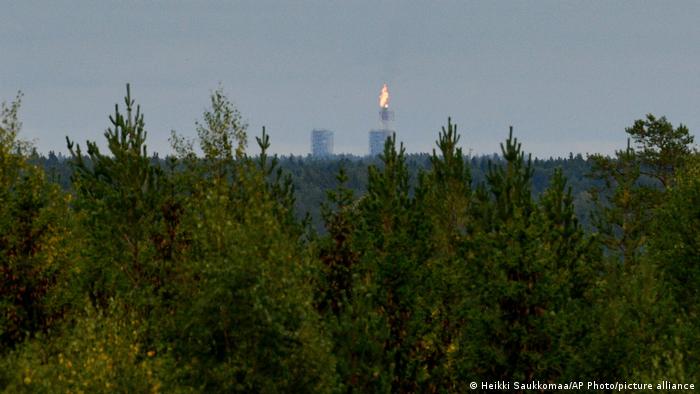
Russia has been wasting vast amounts of natural gas while cutting its supplies to Europe, analysts from the Norwegian energy consultancy Rystad Energy revealed on Friday.
Satellite images of the Portovaya compression station show a huge flare as large amounts of gas are burned off.
The facility is close to the border with Finland and is part of the network that feeds the Nord Stream 1 pipeline bringing gas into Germany. Flows through the pipeline have been reduced to just 20% of its capacity.
Vast amounts of gas being burned
"Exact flaring volume levels are hard to quantify but are believed to be at levels of around 4.34 million cubic meters per day," the consultancy said, adding that the figure "equates to 1.6 billion cubic meters on an annualized basis."
Burning off some gas or oil — known as flaring — is a common practice, but the level being recorded is unusually high.
It was first reported in Finland earlier in the month. Gazprom, the Russian energy giant, may have been burning off €1,000-worth ($998.70) of gas per hour for the past two months, according to Esa Vakkilainen, a professor at LUT University.
Environmental catastrophe
Vakkilainen also warned that this is "a big environmental problem, especially for the North Pole area where this soot has definitely an effect on global warming."
"The flaring is an environmental disaster with around 9,000 tons of CO2 being emitted daily," Rystad said.
Russia is the world's fourth-largest emitter of greenhouse gases and has set a goal of achieving carbon neutrality by 2060. But Gazprom has seen its gas output reduced by 13% since the invasion of Ukraine and the subsequent standoff with the West.
"Although the exact reasons for the burning are unknown, the volume, emissions and location of the flaring are a visible reminder of Russia's dominance over Europe's energy markets," Rystad's market analyst chief Sindre Knutsson told Spanish news agency EFE.
"The flaring flame is highly visible, perhaps indicating that gas is ready and waiting to flow to Europe if friendly political relations resume," the consultancy said.